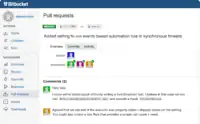Bitbucket
Bitbucket is a Git-based source code repository hosting service owned by Atlassian. Bitbucket offers both commercial plans and free accounts with an unlimited number of private repositories.
Bitbucket Logo | |
Type of site | Collaborative version control |
|---|---|
| Available in | English, German, Russian, French, Simplified Chinese, Spanish, Hindi, Japanese, Korean, Portuguese |
| Owner | Atlassian |
| Created by | Jesper Noehr |
| URL | bitbucket |
| Commercial | Yes |
| Registration | Required with optional OpenID |
| Launched | 2008 |
| Current status | Online |
| Written in | Python |
Services
Bitbucket Cloud
Bitbucket Cloud (previously known as Bitbucket) is written in Python using the Django web framework.[1]
Bitbucket is mostly used for code and code review. Bitbucket supports the following features:
- Pull requests with code review and comments[2]
- Bitbucket Pipelines,[3] a continuous delivery service
- Two-step verification and required two-step verification[4][5]
- IP whitelisting[5]
- Merge Checks[6]
- Code search (Alpha)[7]
- Git Large File Storage (LFS)[8]
- Documentation, including automatically rendered README files in a variety of Markdown-like file formats
- Issue tracking[9]
- Wikis[10]
- Static sites hosted on Bitbucket Cloud: Static websites have the bitbucket.io domain in their URL[11]
- Add-ons and integrations[12]
- REST APIs to build third-party applications which can use any development language[13]
- Snippets that allow developers to share code segments or files[14]
- Smart Mirroring[15]
Bitbucket Server
 | |
| Developer(s) | Atlassian, Inc. |
|---|---|
| Initial release | 2012 |
| Stable release | 7.21.0
/ 28 February 2022 |
| Written in | Java |
| Operating system | Platform-independent |
| Type | distributed revision control revision control |
| License | Proprietary, free for use by official non-profit organizations, charities, and open-source projects, but not governmental, academic or religious organizations[16][17] |
| Website | www |
Bitbucket Server (formerly known as Stash[18]) is a combination Git server and web interface product written in Java and built with Apache Maven.[19] It allows users to do basic Git operations (such as reviewing or merging code, similar to GitHub) while controlling read and write access to the code. It also provides integration with other Atlassian tools.[20]
Bitbucket Server is a commercial software product that can be licensed for running on-premises.[21] Atlassian provides Bitbucket Server for free to open source projects meeting certain criteria, and to organizations that are non-profit, non-government, non-academic, non-commercial, non-political, and secular. For academic and commercial customers, the full source code is available under a developer source license.[21]
History
Bitbucket was previously an independent startup company, founded by Jesper Nøhr in 2008.[22] On 29 September 2010, Bitbucket was acquired by Atlassian.[23] In September 2015, Atlassian renamed their Stash product to Bitbucket Server.[24] In July 2016, Bitbucket added support for Git Large File Storage (LFS).[8] In March 2020, Bitbucket Server controversially dropped support for viewing three way diffs[25] and in July 2020, Bitbucket Cloud removed support for its original repository format Mercurial.[26]
See also
References
- "Django Success Story Bitbucket". 8 June 2008. Archived from the original on 17 March 2011. Retrieved 27 March 2011.
- "Work with pull requests - Atlassian Documentation". confluence.atlassian.com.
- "Build, test and deploy with Pipelines - Atlassian Documentation". confluence.atlassian.com.
- "Two-step verification - Atlassian Documentation". confluence.atlassian.com.
- "Bitbucket Introduces Required Two-Factor Authentication and IP Whitelisting". InfoQ.
- "Suggest or require checks before a merge - Atlassian Documentation". confluence.atlassian.com.
- "Code search in Bitbucket - Atlassian Documentation". confluence.atlassian.com.
- "Bitbucket Cloud Adds Beta Support for Git Large File Storage". InfoQ.
- "Use the issue tracker - Atlassian Documentation". confluence.atlassian.com.
- "Use a wiki - Atlassian Documentation". confluence.atlassian.com.
- "Publishing a Website on Bitbucket Cloud - Atlassian Documentation". confluence.atlassian.com.
- "Bitbucket Cloud add-ons - Atlassian Documentation". confluence.atlassian.com.
- "Use the Bitbucket Cloud REST APIs - Atlassian Documentation". confluence.atlassian.com.
- "Snippets - Atlassian Documentation". confluence.atlassian.com.
- "Smart Mirroring for Bitbucket Cloud - Atlassian Documentation". confluence.atlassian.com.
- Atlassian. "ATLASSIAN – Open Source Project License Request". Atlassian.com. Retrieved 9 November 2012.
- Atlassian. "ATLASSIAN – Community License Request". Atlassian.com. Retrieved 9 November 2012.
- "Bitbucket rebrand FAQ - Atlassian Documentation". confluence.atlassian.com. Retrieved 22 December 2016.
- "Building Bitbucket Server from Source Code". developer.atlassian.com. Retrieved 11 September 2018.
- Atlassian. "Stash is now Bitbucket Server | Atlassian". Atlassian. Retrieved 22 December 2016.
- "Stash: Licensing and Pricing". Atlassian. Archived from the original on 9 May 2012. Retrieved 10 July 2011.
- "Bitbucket on Nabble". Nabble. 31 July 2008. Retrieved 31 August 2020.
- Jenna Pitcher (30 September 2010). "Atlassian snatches Bitbucket". ITWire. Archived from the original on 3 March 2016. Retrieved 30 September 2010.
- Atlassian. "Stash is now Bitbucket Server - Atlassian". Atlassian.
- "How to enable 3-way diff in BitBucket 7.0". Atlassian. Retrieved 18 November 2022.
- Chan, Denise (21 April 2020). "Sunsetting Mercurial support in Bitbucket". Bitbucket. Retrieved 23 March 2021.
